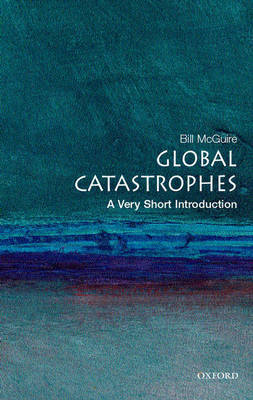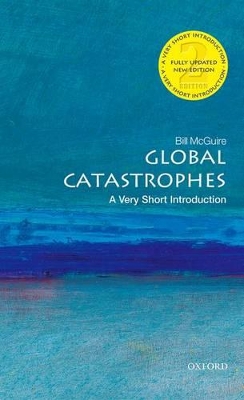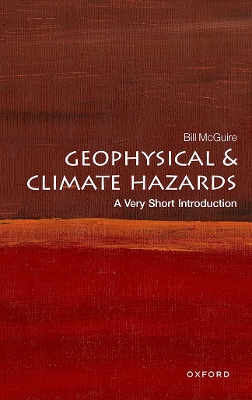Very Short Introductions
3 total works
Life on earth will come to an end. It's just a matter of when. Global Catastrophes: A Very Short Introduction focuses on the many potential catastrophes facing our planet and our species in the future, and looks at both the probability of these events happening and our chances of survival. Coverage extends from discussion of the likely consequences of the current global warming to the inevitable destruction of the earth in the far future, when it is enveloped by our giant, bloated sun. In between, other 'end of the world scenarios' will be examined, including the New Ice Age, asteroid and comet impact, supervolcanoes, and mega-tsunami. ABOUT THE SERIES: The Very Short Introductions series from Oxford University Press contains hundreds of titles in almost every subject area. These pocket-sized books are the perfect way to get ahead in a new subject quickly. Our expert authors combine facts, analysis, perspective, new ideas, and enthusiasm to make interesting and challenging topics highly readable.
Life on earth will come to an end. It's just a matter of when. In this Very Short Introduction, Bill McGuire explores the many potential catastrophes facing our planet and our species in the future, and looks at both the probability of these events happening and our chances of survival.
From the likely consequences of global warming to the inevitable destruction of the earth in the far future, McGuire considers a range of 'end of the world scenarios', including the New Ice Age, asteroid and comet impact, supervolcanoes, and mega-tsunami.
Updated with a number of recent case studies from around the world, this new edition brings our understanding of global disasters and risk research up to date.
ABOUT THE SERIES: The Very Short Introductions series from Oxford University Press contains hundreds of titles in almost every subject area. These pocket-sized books are the perfect way to get ahead in a new subject quickly. Our expert authors combine facts, analysis, perspective, new ideas, and enthusiasm to make interesting and challenging topics highly readable.
From the likely consequences of global warming to the inevitable destruction of the earth in the far future, McGuire considers a range of 'end of the world scenarios', including the New Ice Age, asteroid and comet impact, supervolcanoes, and mega-tsunami.
Updated with a number of recent case studies from around the world, this new edition brings our understanding of global disasters and risk research up to date.
ABOUT THE SERIES: The Very Short Introductions series from Oxford University Press contains hundreds of titles in almost every subject area. These pocket-sized books are the perfect way to get ahead in a new subject quickly. Our expert authors combine facts, analysis, perspective, new ideas, and enthusiasm to make interesting and challenging topics highly readable.
Very Short Introductions: Brilliant, Sharp, Inspiring
In this Very Short Introduction Bill McGuire takes a fresh look at our sometimes perilous planet, and evaluates the causes and consequences of what used to be thought of as 'natural' hazards through the prism of planetary heating and the continuing destabilising of our climate.
Our world has always been a dangerous and deadly place, and storms, floods, earthquakes, tsunamis and volcanic blasts have taken an enormous toll on lives and livelihoods throughout recorded history and before. In the past, such events were regarded first as acts of God, or gods, and later as simply a consequence of hazardous natural phenomena that are a normal part of how our planet works. In recent decades, however, this picture has changed. Relentless global heating, arising from the 2.4 trillion tonnes of carbon dioxide pumped into the atmosphere as a result of human activities, has completely altered the 'natural' hazard landscape. There has long been a debate about whether - due to the influence of societal and economic factors - there is such a thing as a truly natural disaster. Now, the debate has moved on to whether or not the hazards that cause them can any longer be described as entirely natural. Our damaged climate has driven an explosion of extreme weather, which has become ever more apparent in recent years via the super-charging of storms, floods, heatwaves and wildfires. The fingerprints of global heating can be detected even in individual events that would have been extremely unlikely to have happened, or even been impossible, in its absence. Meanwhile earthquakes, tsunamis and volcanic eruptions continue to plague communities and take lives, while even here there are links with a changing climate that have the potential to magnify their occurrence and impacts.
ABOUT THE SERIES: The Very Short Introductions series from Oxford University Press contains hundreds of titles in almost every subject area. These pocket-sized books are the perfect way to get ahead in a new subject quickly. Our expert authors combine facts, analysis, perspective, new ideas, and enthusiasm to make interesting and challenging topics highly readable.
In this Very Short Introduction Bill McGuire takes a fresh look at our sometimes perilous planet, and evaluates the causes and consequences of what used to be thought of as 'natural' hazards through the prism of planetary heating and the continuing destabilising of our climate.
Our world has always been a dangerous and deadly place, and storms, floods, earthquakes, tsunamis and volcanic blasts have taken an enormous toll on lives and livelihoods throughout recorded history and before. In the past, such events were regarded first as acts of God, or gods, and later as simply a consequence of hazardous natural phenomena that are a normal part of how our planet works. In recent decades, however, this picture has changed. Relentless global heating, arising from the 2.4 trillion tonnes of carbon dioxide pumped into the atmosphere as a result of human activities, has completely altered the 'natural' hazard landscape. There has long been a debate about whether - due to the influence of societal and economic factors - there is such a thing as a truly natural disaster. Now, the debate has moved on to whether or not the hazards that cause them can any longer be described as entirely natural. Our damaged climate has driven an explosion of extreme weather, which has become ever more apparent in recent years via the super-charging of storms, floods, heatwaves and wildfires. The fingerprints of global heating can be detected even in individual events that would have been extremely unlikely to have happened, or even been impossible, in its absence. Meanwhile earthquakes, tsunamis and volcanic eruptions continue to plague communities and take lives, while even here there are links with a changing climate that have the potential to magnify their occurrence and impacts.
ABOUT THE SERIES: The Very Short Introductions series from Oxford University Press contains hundreds of titles in almost every subject area. These pocket-sized books are the perfect way to get ahead in a new subject quickly. Our expert authors combine facts, analysis, perspective, new ideas, and enthusiasm to make interesting and challenging topics highly readable.


